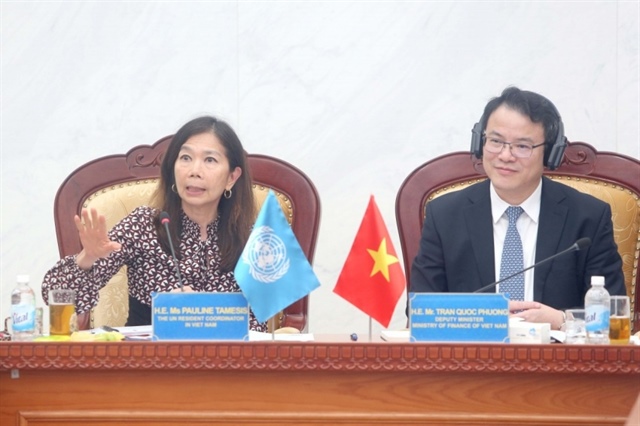Our Terms & Conditions | Our Privacy Policy
Vietnam and UN plan to enhance development cooperation
Vietnam and UN plan to enhance development cooperation
Deputy Minister of Finance Tran Quoc Phuong and United Nations (UN) Resident Coordinator Pauline Tamesis co-chaired a meeting of the Joint Steering Committee (JSC) on cooperation between Vietnam and the UN on August 27.
|
Deputy Minister of Finance Tran Quoc Phuong and UN Resident Coordinator Pauline Tamesis co-chairing the meeting
|
Deputy Minister of Finance Tran Quoc Phuong stated that Vietnam’s government considers official development assistance (ODA), concessional loans from foreign donors, and non-refundable ODA, as important resources. These are prioritised for investment in key infrastructure and economic projects with high spillover effects and for promoting socioeconomic development.
“Notably, with amendments to the Law on Public Investment, Law on State Budget, Law on Bidding, and Law on Management and Use of Public Assets, the Vietnamese government has strongly decentralised and delegated authority in the management and use of non-refundable ODA,” Phuong stated.
Therefore, the deputy minister asked to focus on issues related to development cooperation between Vietnam and the UN. This includes sharing and reviewing reports on the overall mobilisation and use of ODA funded or co-mobilised by the UN. Challenges and obstacles also needed to find appropriate solutions, as well as setting the direction for building the next cooperation strategy for 2027-2031.
Agreeing with Phuong, Tamesis emphasised that the purpose of the meeting was to establish a strategic dialogue to identify strategic priorities for Vietnam’s upcoming socioeconomic development plans, provide feedback and practical guidance on processes and priorities to accelerate implementation of the current Cooperation Fund, and jointly design a new one.
She proposed restructuring the JSC into a platform for strategic policy dialogue. “We could elevate the JSC into a forum for identifying emerging opportunities and risks, exchanging knowledge, conducting evidence-based research and analysis, and building new partnerships. It would also help set international standards and norms, provide access to global expertise, and offer policy advice on critical development transitions and financial options,” she said.
Additionally, the forum would outline potential issues to initiate dialogue on financing policies for national development priorities and explore breakthroughs amid growth risks, laying the groundwork for substantive recommendations for the new Comprehensive Partnership Fund.
Tamesis further suggested, “Amid declining ODA, Vietnam should turn external financial challenges into opportunities, by enhancing the role of domestic finance and leveraging ODA as a catalyst for key investment priorities.”
As a developing economy, Vietnam has room to improve domestic resource mobilisation. It is well positioned to channel foreign direct investment into sustainable development sectors such as renewable energy, climate-resilient infrastructure, digital transformation, and technology.
|
Under the coordination of the two co-chairs, participants presented and listened to discussions on such topics as implementation results and evaluations of the 2022–2026 Cooperation Framework; progress achieved, challenges, and priorities for 2025-2026; updates on the draft amendment to Decree No.114/2021/ND-CP, with a focus on solutions to overcome obstacles in managing and receiving UN non-refundable ODA; a presentation of the Cooperation Framework evaluation for 2022–2026; the roadmap for developing the 2027-2031 cooperation framework; updates on the country analysis including consultation results; and the anticipated priorities of Vietnam’s 2026-2030 Socioeconomic Development Plan.
Deputy Minister Phuong said that the Vietnamese government has completed a legal framework concerning the management and use of non-refundable aid, including UN technical support, within the broader scope of non-refundable aid.
He called on ministries and agencies to continue close coordination with UN organisations, actively resolve difficulties, and urgently approve and implement projects. He urged UN agencies to actively mobilise resources, engage in technical discussions with the Ministry of Finance and relevant partners, and provide project direction that aligns with the Vietnamese government’s priorities.
VIR
Images are for reference only.Images and contents gathered automatic from google or 3rd party sources.All rights on the images and contents are with their legal original owners.




Comments are closed.